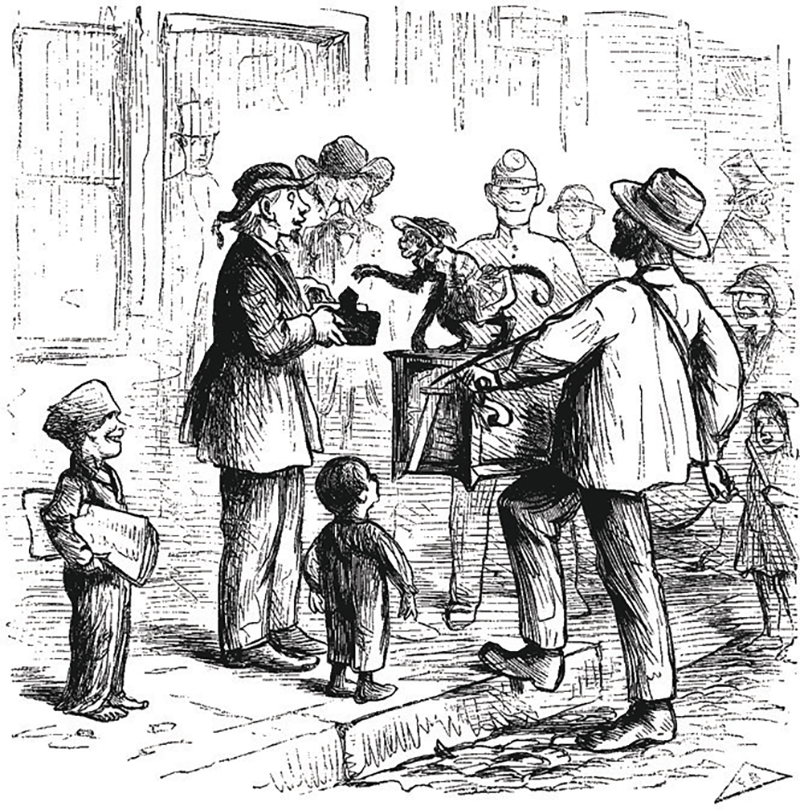The entrance to Castle Garden was blocked up with vehicles, peddlers of cheap cigars, apple stands, and runners from the boarding houses and intelligence offices that abound in the neighborhood near the Battery. However, I succeeded in getting through after encountering an outpouring stream of new arrivals. I presented my passport to the officer on guard and was ushered inside, amidst a crowd of passengers, children, and baggage of all kinds. Into this yard open the different offices connected with the Garden.
The desks of the exchange brokers are at present occupied by four firms, each working in its own interest. A blackboard announces the current rates at which foreign and domestic coin are exchanged—a rate that is but a trifle below the Wall Street quotation. Whenever a change takes place in the street, it is instantly reported to the brokers in the Garden, and the rate on the blackboard is altered accordingly.
An Englishman comes along and changes a sovereign, for which he receives, say, $5.70, according to the then-present rate. A moment later gold goes down one percent or one and a half on Wall Street; it is instantly recorded at the Garden, and the prices are altered. Our friend comes along again; but now he only receives $5.65 for his gold. “Ay, sir, you have made a mistake,” he says. The broker’s clerk says he has not, and tries to explain. But it is no use. Less than two minutes ago he got $5.70 for his sovereign, and now he gets five cents less! “No, no,” says he, shaking his head incredulously. “Gold is gold. This ’ere is good British money; no change in that; that stands to reason.” He is offered his sovereigns back if he chooses, but lets it pass, scratching his head and saying, “Blast the durned paper money, that one can’t make neither head nor tail out of!”

Sovereigns and Prussian thalers form the bulk of exchange; but other coins, of nearly all countries and denominations, are also daily exchanged. American gold is very frequently brought over. Twenty-dollar pieces, eagles, and half-eagles are the denominations most used; but many bring over small one-dollar gold pieces, of which one out of every four or five is perforated with a hole, as if it had been used for a charm.
One poor fellow, a Frenchman who came over on the Holland, brought with him a Parisian bank note for fifty francs—all the money he had. Under other circumstances the note would have been exchanged at the Garden at par; but owing to the present uncertain value of French paper money caused by the war, it could not be redeemed there. He could not possibly understand how a note for fifty francs on the Bank of France could not be equal to the same amount in bright silver or gold; it was at par at home when he left, and his faith in the bank of la belle France was unshaken. He refused to change it at a discount, and left, doubting and disgusted.
Some time ago a Mecklenburg farmer arrived who had quite a considerable sum of money in greenbacks on his person. To keep it safe he had sewed it into the lining of his shirt, where he had worn it during the whole voyage. When he came to open his package, he found that two fifty-dollar bills had become stuck together, caused by the perspiration of his body and some adherent matter probably sticking to the paper. They stuck together as one bill as nicely as if they had been glued together by an artist.
Loud were his lamentations and great was his distress. He tried to peel them carefully asunder with his thumbnail, but only succeeded in tearing the paper. He commenced crying, when somebody advised him to give the refractory bills a cold-water bath. He did so, and lo! the bills came apart as nicely as two sheets of mica, and his one fifty-dollar bill was made good for a hundred dollars. Great now was his joy, and he was shortly after seen treating at least a score of his shipmates to schnapps and lager.
From “A Day in Castle Garden,” which appeared in the March 1871 issue of Harper’s Magazine.





























































































